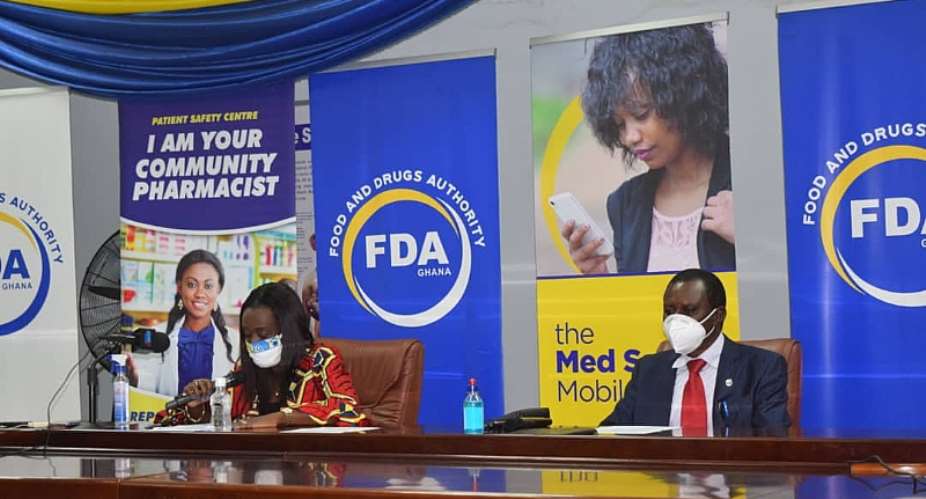As part of measures to boost food safety and standards, the Food and Drugs Authority (FDA) has introduced a new regime of licensing for food processors under the Cottage or Small Sized Food Processors (CSSFP).
According to the FDA, the Majority of these food processors are unable to meet the appropriate regulatory requirements and operate through unauthorized means.
It is for this reason that the Food and Drugs Authority (FDA) has launched the Progressive Licensing Scheme (PLS) for such food processors.
The Chairman of the FDA’s Governing Board, Dr. Sammy Ohene, at the program launch, acknowledged that “this program is being launched at a time when a number of cottages or small-scale businesses are being financially supported by the government. This strategy to improve the well-being of cottage or small-scale food processors without compromising food safety is a step in the right direction.”

He asserted that hopefully, the launch of this licensing program “will encourage every cottage or small scale food processor to comply with the rules and regulations of the FDA.” The Scheme
The Progressive Licensing Scheme (PLS) is a risk-based approach scheme where three types of food manufacturing facility license certificates assuring the safe production of food will be given to qualifying applicants.
It is based on a Good Manufacturing Practices (GMP) Standard where applicants get scored during an inspection and are awarded certificate ranges from pink (level 1) or yellow (level 2) or green (level 3) and hence the progressive nature.
The objective of this scheme is to help the local food industry grow to the extent that all grocery shops and supermarkets be stocked with at least 60% of made in Ghana food products.
Speaking at the launch of the scheme, the Chief Executive Officer of the FDA, Mimi Delese Darko, disclosed that about 50% of CSSFP were unsuccessful in the registration processes but had gone ahead to sell.
She said, “2019 statistics from FDA market surveillance showed that 661 locally manufactured products in the Greater Accra Region were not registered as per the Public Health Act 851 (2012) but were on the market.”

She attributed some of the reasons for this poor practice to the cost of laboratory testing of products as part of registration requirements, the lack of adequate knowledge of required processes and documentation and the inability of many cottages or small scale to meet facility establishment requirements.
It is for these reasons that the FDA had to step in with the introduction of the PLS “to support these small units, as they provide employment and generate income for their operators”.
According to Mrs. Darko, the new licensing scheme “which is based on high quality, transparent, and independent scientific advice following risk analysis, provides a high level of health protection for all. Furthermore, food products produced by cottage and small scale sized food processors can be traced and recalled when necessary.”
On his part, the acting Head of the Food Division department, Roderick Daddey-Adjei outlined some of the benefits that come with the launch of the new licensing program.
He stated, “The introduction of a Progressive Licensing Scheme (PLS) for Manufacturing facilities will help get more manufacturing about cottages or small status licensed facilities without compromising on the basic requirements of GMPs. As more cottage/small scale manufacturing facilities get registered the safety of food supplies in the formal and informal markets get assured.”
He also noted that there will be a drastic reduction in the cost of laboratory analyses of food product testing with the launch of PLS.
---CitinewsRoom





 They made it seem I intentionally spotted the child with telescope and killed hi...
They made it seem I intentionally spotted the child with telescope and killed hi...
 KT Hammond to lay LI on cement price regulation after manufacturers boycotted st...
KT Hammond to lay LI on cement price regulation after manufacturers boycotted st...
 Reserve a quota for cadet corps when recruiting - Bawumia tells security service...
Reserve a quota for cadet corps when recruiting - Bawumia tells security service...
 My dollar advice was honest, not speculative – Isaac Adongo replies Dr. Amin Ada...
My dollar advice was honest, not speculative – Isaac Adongo replies Dr. Amin Ada...
 Free SHS Bill: Lack of rigorous stakeholder consultation unfortunate – Minority
Free SHS Bill: Lack of rigorous stakeholder consultation unfortunate – Minority
 ‘You’ll lose our votes if you stick with 'arrogant' NAPO as running mate’ – Pro-...
‘You’ll lose our votes if you stick with 'arrogant' NAPO as running mate’ – Pro-...
 Akufo-Addo being insensitive to Ghanaians' plight with continuous ministerial ap...
Akufo-Addo being insensitive to Ghanaians' plight with continuous ministerial ap...
 ‘We will not, and cannot be part of this process’ – Minority boycotts vetting of...
‘We will not, and cannot be part of this process’ – Minority boycotts vetting of...
 Election 2024: We’ll win based on loyalty, dedication of our members — Fifi Kwet...
Election 2024: We’ll win based on loyalty, dedication of our members — Fifi Kwet...
 Nine out of every 10 Ghanaian rents yet gov’ts have failed to address the challe...
Nine out of every 10 Ghanaian rents yet gov’ts have failed to address the challe...
